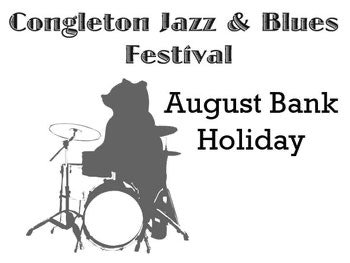I'm a Morris dancer. I used to know a dancer who often sang this song in pub sessions. The words are modern, based on the folk tale, and it is sung to a traditional Morris dance tune.
Below is a link to the lyrics. I've also copied and pasted the lyrics. Below that is a link to a professional recording of the song on You Tube.
http://www.goldenhindmusic.com/lyrics/CONGLETO.html
The wakes coming on and the bear he took ill
We tried him with potion, with brandy and pill
He died in his sleep at the eve of the wakes
The cause, it was said, was strong ale and sweet cakes:
The cheeses of Cheshire are famed, but beware
Of stories they tell of the Congleton Bear
Congleton Bear, Congleton Bear
They sold the church Bible to buy a new bear.
He served the town well and he served town true
To lie him in state was the least they could do
The old bear was dead, a successor they'd need
A new bear was wanted, and that at great speed:
Now a parson is useful in times of great need
And imbibed with strong porter he quickly agreed
The parson, his Bible he give then and there
We sold it in Nantwich to buy a new bear:
Oh, the new bear, a she-bear, was toast of the town
To music and laughter she danced up and down
So loudly the cheering would waken the dead
It caused the old bear for to rise from his bed:
Pills, potion and brandy induced a deep trance
And refreshed by the music he began for to dance
He danced down the road causing many a gaze
Word quickly spread that the old bear was raised:
He rolled his dark eye as he spied the she-bear
And with an embrace they danced jigs pair-and-pair
The cheeses of Cheshire are famed but beware
Of stories they tell of the Congleton Bear:






